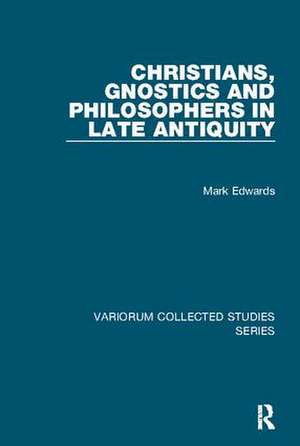Christians, Gnostics and Philosophers in Late Antiquity: Variorum Collected Studies
Autor Mark Edwardsen Limba Engleză Paperback – 22 mai 2017
Din seria Variorum Collected Studies
-
 Preț: 311.18 lei
Preț: 311.18 lei -
 Preț: 310.55 lei
Preț: 310.55 lei -
 Preț: 299.55 lei
Preț: 299.55 lei - 9%
 Preț: 1041.23 lei
Preț: 1041.23 lei -
 Preț: 386.77 lei
Preț: 386.77 lei -
 Preț: 351.48 lei
Preț: 351.48 lei -
 Preț: 313.38 lei
Preț: 313.38 lei -
 Preț: 386.77 lei
Preț: 386.77 lei -
 Preț: 310.22 lei
Preț: 310.22 lei -
 Preț: 258.66 lei
Preț: 258.66 lei -
 Preț: 343.33 lei
Preț: 343.33 lei - 9%
 Preț: 938.44 lei
Preț: 938.44 lei -
 Preț: 311.41 lei
Preț: 311.41 lei - 9%
 Preț: 938.85 lei
Preț: 938.85 lei -
 Preț: 312.75 lei
Preț: 312.75 lei - 9%
 Preț: 936.60 lei
Preț: 936.60 lei -
 Preț: 341.55 lei
Preț: 341.55 lei -
 Preț: 320.00 lei
Preț: 320.00 lei - 34%
 Preț: 764.20 lei
Preț: 764.20 lei - 22%
 Preț: 312.43 lei
Preț: 312.43 lei - 34%
 Preț: 739.65 lei
Preț: 739.65 lei - 34%
 Preț: 764.20 lei
Preț: 764.20 lei - 34%
 Preț: 680.73 lei
Preț: 680.73 lei - 26%
 Preț: 247.40 lei
Preț: 247.40 lei - 34%
 Preț: 485.78 lei
Preț: 485.78 lei - 34%
 Preț: 764.20 lei
Preț: 764.20 lei - 34%
 Preț: 769.51 lei
Preț: 769.51 lei - 34%
 Preț: 764.20 lei
Preț: 764.20 lei - 34%
 Preț: 826.68 lei
Preț: 826.68 lei - 25%
 Preț: 222.32 lei
Preț: 222.32 lei - 25%
 Preț: 225.54 lei
Preț: 225.54 lei - 34%
 Preț: 767.07 lei
Preț: 767.07 lei - 34%
 Preț: 764.20 lei
Preț: 764.20 lei - 34%
 Preț: 736.38 lei
Preț: 736.38 lei - 34%
 Preț: 738.42 lei
Preț: 738.42 lei - 25%
 Preț: 226.52 lei
Preț: 226.52 lei - 33%
 Preț: 491.66 lei
Preț: 491.66 lei - 34%
 Preț: 485.78 lei
Preț: 485.78 lei - 34%
 Preț: 485.78 lei
Preț: 485.78 lei - 34%
 Preț: 764.20 lei
Preț: 764.20 lei - 34%
 Preț: 736.38 lei
Preț: 736.38 lei - 31%
 Preț: 473.94 lei
Preț: 473.94 lei - 18%
 Preț: 807.71 lei
Preț: 807.71 lei - 34%
 Preț: 764.20 lei
Preț: 764.20 lei - 34%
 Preț: 764.20 lei
Preț: 764.20 lei - 34%
 Preț: 764.20 lei
Preț: 764.20 lei - 51%
 Preț: 485.78 lei
Preț: 485.78 lei - 34%
 Preț: 485.78 lei
Preț: 485.78 lei - 34%
 Preț: 769.10 lei
Preț: 769.10 lei - 34%
 Preț: 766.65 lei
Preț: 766.65 lei
Preț: 299.52 lei
Preț vechi: 341.55 lei
-12% Nou
Puncte Express: 449
Preț estimativ în valută:
57.33€ • 59.62$ • 48.04£
57.33€ • 59.62$ • 48.04£
Carte tipărită la comandă
Livrare economică 13-27 martie
Preluare comenzi: 021 569.72.76
Specificații
ISBN-13: 9781138115682
ISBN-10: 1138115681
Pagini: 330
Dimensiuni: 150 x 224 x 23 mm
Greutate: 0.45 kg
Ediția:1
Editura: Taylor & Francis
Colecția Routledge
Seria Variorum Collected Studies
Locul publicării:Oxford, United Kingdom
ISBN-10: 1138115681
Pagini: 330
Dimensiuni: 150 x 224 x 23 mm
Greutate: 0.45 kg
Ediția:1
Editura: Taylor & Francis
Colecția Routledge
Seria Variorum Collected Studies
Locul publicării:Oxford, United Kingdom
Cuprins
Contents: Preface; Part I Christians and Pagans in Dispute: Quoting Aratus: Acts 17.28; Some early Christian immoralities; Justin's logos and the word of God; Satire and verisimilitude: Christianity in Lucian's Peregrinus; Xenophanes Christianus?; Pagan and Christian monotheism in the age of Constantine; Notes on the date and venue of the Oration to the Saints; Dracontius the African and the fate of Rome. Part II Gnostic Thought and its Milieu: Gnostics and Valentians in the church fathers; Neglected texts in the study of Gnosticism; Pauline Platonism: the myth of Valentinus; The tale of Cupid and Psyche; Porphyry's Cave of the Nymphs and the Gnostic controversy. Part III Christianity and the Platonic Tradition: Socrates and the early Church' Origen's Platonism: questions and caveats; Ammonius, teacher of Origen; Birth, death and divinity in Porphyry's Life of Plotinus; Porphyry and the intelligible triad; The figure of love in Augustine and in Proclus the neoplatonist; Index.
Notă biografică
Dr Mark Edwards is University Lecturer in Patristics, and Tutor in Theology, Christ Church, University of Oxford, UK
Descriere
Gnosticism, Christianity and late antique philosophy are often studied separately; when studied together they are too often conflated. These articles set out to show that we misunderstand all three phenomena if we take either approach. We cannot interpret, or even identify, Christian Gnosticism without Platonic evidence; we may even discover that Gnosticism throws unexpected light on the Platonic imagination. At the same time, if we read writers like Origen simply as Christian Platonists, or bring Christians and philosophers together under the porous umbrella of 'monotheism', we ignore fundamental features of both traditions.
